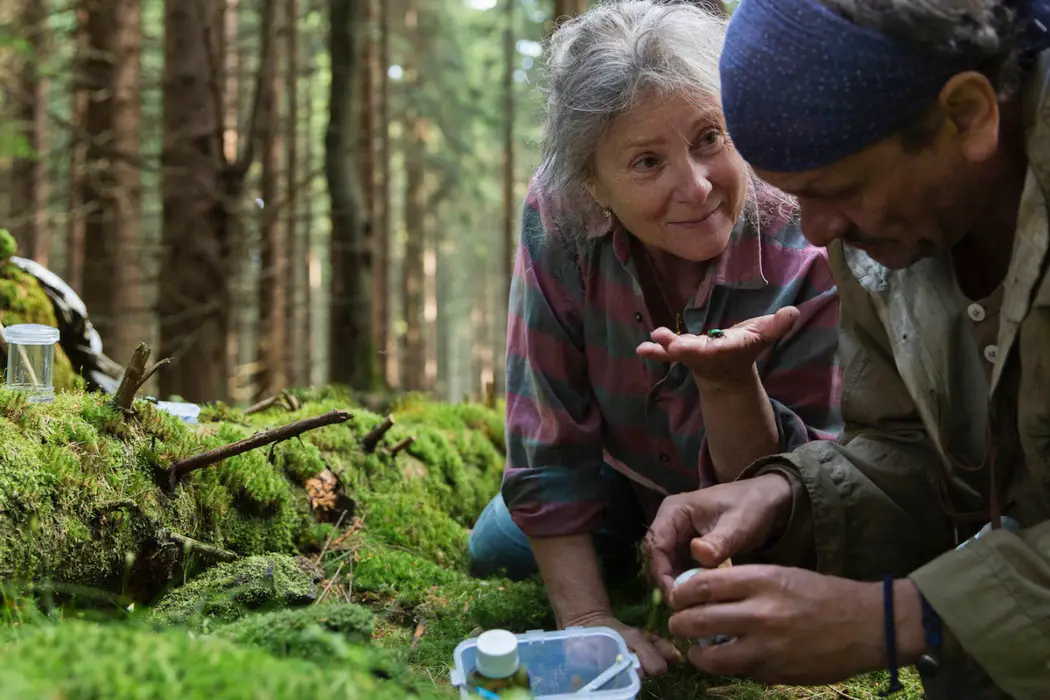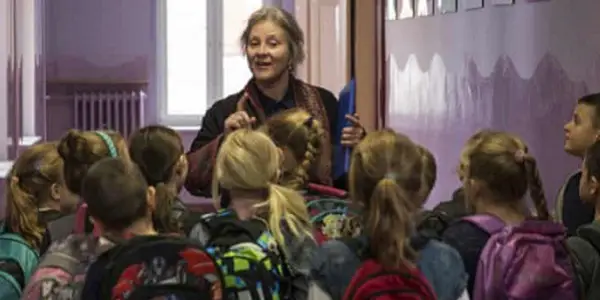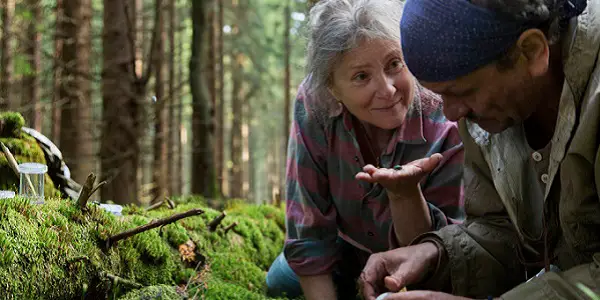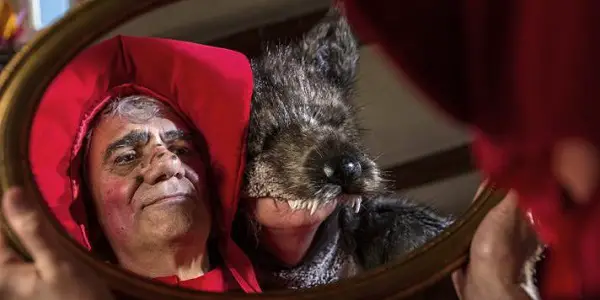SPOOR: When The Hunters Become The Hunted

Lee Jutton has directed short films starring a killer toaster,…
Directed by acclaimed filmmaker Agnieszka Holland (Europa, Europa, Mr. Jones) with her daughter Kasia Adamik, Spoor won a Silver Bear at the 2017 Berlin Film Festival and was Poland’s submission for Best Foreign Language Film at the 2018 Academy Awards. That it is only just now becoming available widely in the United States via on-demand feels odd, as though the film contains some reason for embarrassment. Or perhaps it’s just that Spoor, adapted from the novel Drive Your Plow Over the Bones of the Dead by Olga Tokarczukd — a winner of the Nobel Prize for Literature who co-wrote the film’s script with Holland — is a rather difficult pill to swallow. An ecological thriller that is not without flashes of humor courtesy of its wonderfully weird cast of characters, Spoor is guaranteed to make many audience members uncomfortable. In my case, it also left me hopeful.
“All Who Were Born Must Die.”
Janina Duszejko (Agnieszka Mandat-Grabka) spent her youth as a revolutionary-minded civil engineer, building bridges in far-flung countries and trying to change the world for the better. Now, she has retired to a small village in Poland near the Czech border, where she teaches English part-time, studies astrology, and cares for her two dogs.
Duszejko — she refuses to answer to her first name despite people constantly mispronouncing her surname — is a passionate animal lover and strict vegetarian who is constantly at odds with the hunting enthusiasts in her village. Unfortunately, they all happen to be some of the most powerful men in the town, including the mayor, the police chief, and a corrupt local business owner named Wnetrzak (Borys Szyc), whose cruel fox farm is an object of particular ire for Duszejko.

One day, Duszejko’s beloved dogs don’t come home. Full of fury and fear that they were killed by the hunters, Duszejko contacts the authorities to complain. But the local priest tells her that it is a sin to treat animals like people, and the police laugh her out of the station, dismissing her as nothing more than a crazy old woman.
Soon after, one of her neighbors, a kindly mushroom picker she calls Matoga (Wiktor Zborowski), wakes her in the night after discovering another neighbor — one of the hunters — dead. He appears to have choked on a bone, but foul play is not ruled out — especially when other hunters and pillars of their extremely patriarchal community start turning up dead too, their bodies mysteriously surrounded by animal tracks. Is this nature finally seeking revenge on humanity, as Duszejko claims, or is something else afoot?
“It’s Not You Who Started This War.”
As the mystery unfolds and refolds in on itself, more people come under suspicion for the killings, including Duszejko herself. Meanwhile, this woman whose missing dogs were the closest thing she had to family acquires a new family of close friends who benefit from her innate desire to take care of the less fortunate. They include Matoga, whose German-born mother suffered indignities from his father, a concentration camp survivor who married her out of hatred; Nowina (Patrycja Volny), a young woman who works in Wnetrzak’s thrift shop as well as his brothel and is struggling to gain custody of her younger brother from an orphanage; Dyzio (Jakub Gierszal), a computer wizard who lost his dream job in Berlin when they discovered he had seizures and now handles IT for the local police; and Boros (Miroslav Krobot), a Czech entomologist who becomes romantically involved with Duszejko when he meets her while researching beetles in the area. Their various backstories are highlighted in scattered, feverish moments of flashback, which are initially a bit confusing but end up bringing the most impactful moments of these characters’ lives to life better than any amount of spoken dialogue ever could.

Together, this oddball collection of damaged people work to heal each other’s deep-seated wounds, and it is the evolution of their relationships that keeps one invested in the human side of Spoor even as the plot takes some eyebrow-raising turns, culminating in an ending that feels almost unbelievable in its optimism — though goodness knows, we could all use a little bit of that optimism right now. Their little quirks — Dyzio’s insistence on owning no more than 80 possessions, Duszejko’s passion for creating star-charts for everyone she runs into — make them feel all the more realistic and drive home why these various lost souls were inevitably drawn to each other, deeply empathetic misfits in a world that celebrates hyper-masculine power and violence.
It helps that the actors are all brilliant and believable in their roles, especially Agnieszka Mandat-Grabka as our unlikely, anarchist heroine Duszejko. Her passion for saving animals occasionally comes off as a little unhinged, but at her heart is undeniable, admirable compassion that more of humanity could do well with embracing. Spoor doesn’t shy away from her imperfections, painting her as a flawed but well-meaning human being as opposed to some kind of genius superhero, and that makes her all the more likable. She also has plenty of opportunities to be warm and funny, which are needed in a film focused on such dark topics.

Speaking of dark topics, a warning: Spoor is resolutely opposed to violence towards animals and doesn’t shy away from portraying it on screen in order to get its point across. There are painful images of foxes cowering in the cages at Wnetrzak’s farm, and a wild boar being comforted by a weeping Duszejko as it dies from a hunter’s bullet. Depending on your sensitivity to this kind of content, Spoor may be too traumatic for you to watch. As someone who feels deep compassion towards animals, I found it greatly upsetting.
Fortunately, these moments of horror are counterbalanced by moments of glorious beauty courtesy of cinematographers Jolanta Dylewska and Rafal Paradowski, whose close-ups of wild animals frolicking peacefully in their natural habitats and wide shots of the lovely rural landscape celebrate everything that Duszejko is so desperate to save. Accompanied by Antoni Komasa Lazarkiewicz’s evocative musical score, all frantic strings, and percussive beats, the result is a film that doesn’t so much promote ecoterrorism (as Holland said one critic accused her of doing) as it does ask why we’ve created a world in which, for many, that feels like the only option—answering violence with violence when all we really want is peace.
Conclusion
Spoor combines the plot of a murder mystery with the morality of an old-fashioned fable to convey a message of righteous environmentalist — not to mention feminist — anger. It’s an odd mix, but it works, thanks to the talented women who have shepherded it to the screen.
What do you think? What is your favorite film by Agnieszka Holland? Share your thoughts in the comments below.
Spoor is available on VOD on January 22, 2021.
Watch Spoor
Does content like this matter to you?
Become a Member and support film journalism. Unlock access to all of Film Inquiry`s great articles. Join a community of like-minded readers who are passionate about cinema - get access to our private members Network, give back to independent filmmakers, and more.
Lee Jutton has directed short films starring a killer toaster, a killer Christmas tree, and a not-killer leopard. Her writing has appeared in publications such as Film School Rejects, Bitch: A Feminist Response to Pop Culture, Bitch Flicks, TV Fanatic, and Just Press Play. When not watching, making, or writing about films, she can usually be found on Twitter obsessing over soccer, BTS, and her cat.













